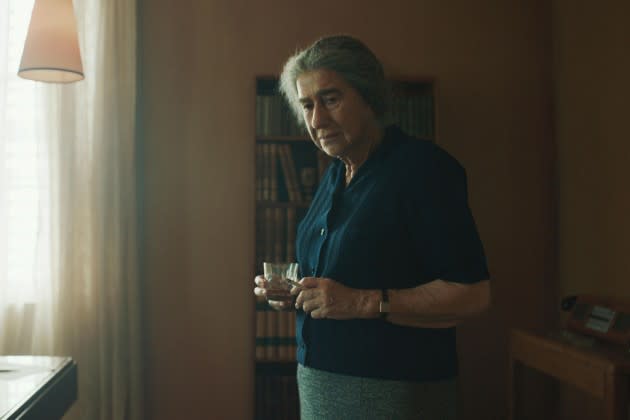‘Golda’ Director Guy Nattiv Address Helen Mirren Casting, Details Making an ‘Authentic’ Israeli Story
- Oops!Something went wrong.Please try again later.
- Oops!Something went wrong.Please try again later.
- Oops!Something went wrong.Please try again later.

Skin is a subject Israeli-American director Guy Nattiv touches on frequently in his work. He has directed no fewer than two (unrelated) films titled “Skin,” one feature-length, one short. The former, which premiered in Toronto in 2018, saw Jamie Bell win rave reviews as a white supremacist who tortuously has his tattoos lasered off after managing to break away from the Neo-Nazi cult that raised him. The latter, which Nattiv produced alongside his wife, Jaime Ray Newman, won the Oscar for live action short in 2019.
Now Nattiv returns with “Golda,” his first feature since Toronto and another character study, this time of Israel’s fourth prime minister, Golda Meir, who is played by Helen Mirren. The film, which also stars Liev Schreiber and Camille Cottin, is set during the 1973 Yom Kippur war, when a coalition of Arab states launched a surprise attack on Israel on the holiest day in the Jewish calendar.
More from Variety
Mirren, of course, is neither Israeli nor Jewish and news of her casting last year caused some controversy, given she was playing one of Jewish history’s most remarkable female figures. At the time, Nattiv declined to comment on the furore. Now, when Variety asks him what he made of the discussion he answers comprehensively but with the weary resignation of someone who knows they’ll be answering the same question repeatedly over the next year (Bleecker Street will release the film in the U.S. in August; Embankment is handling sales).
“So I’m gonna tell my story. I’m gonna tell my authentic story I tell all the time,” he says. “For me, it’s not about Jewish or not Jewish, but for me it’s ‘Does she have the Jewish soul? Does she have the neshama [“soul” in Hebrew]?’ If she has the neshama, the Jewish soul, she can be this person.”
When Mirren originally expressed an interest in the project, Nattiv suggested they meet, first on Zoom (“I fell in love immediately,” he says) and then later at his house, where she arrived “with flip flops and coffee one morning.”
“I was like, ‘Holy shit, this is insane,’” he recalls. “I was totally convinced that she could be Golda.” Nattiv saw in her, he says, a mixture of softness and firmness that reminded him of both his own grandmother and Meir, often dubbed the “Iron grandmother of Israel.”
Nattiv usually directs from screenplays he has penned himself but “Golda, which was written by “Florence Foster Jenkins” scribe Nicholas Martin, came to him via his agent.
Nattiv loved the script but the original version was a “massive war movie,” he says, which he didn’t want to do. So he told his agent he would board the project if it could be re-written to focus more narrowly on Golda. “I wanted to get under her skin,” Nattiv says, returning to that word again. “I wanted to get into […] who this woman was, especially in time of war.” The result sees the film focused predominantly on Golda as she splits her time between fighting a war and fighting lymphatic cancer, which would kill her five years later. “I think that a lot of people did not know that she was sick, did not know the physical torment that she went through while she was fighting the war,” Nattiv says. “It was the war of her body as well as her mind.”
Despite Meir’s remarkable life story — she was born in Ukraine, emigrated to Milwaukee, Wisc., as a child and eventually rose through Israeli politics to become the country’s first female leader — Nattiv was not interested in making a traditional biopic. “For me, it was just more interesting cinematically and as a creator, as a filmmaker, to say something about this woman and about her state and about the country we lived in,” explains the director, who was just a few months old when the war broke out. “My mom ran to the shelter with me as a baby.”
His personal link to the subject matter is perhaps why the director was set on making “Golda” as “authentic as possible” by hiring a mostly Israeli crew and cast, editing and shooting some of the film in Israel (the rest was shot in London) and even interspersing it with real footage and audio of both Meir and the war itself. “All the background — like they did so brilliantly in [HBO series] ‘Chernobyl,’ they had kind of a Ukrainian-Russian radio chatter — I wanted all the authentic recordings from the war,” he says.
Nattiv’s next project, titled “Harmonia,” will be about his actual grandmother, a Holocaust survivor who emigrated to Israel before joining a cult and relocating to Virginia, where, in accordance with the cult’s practices, she was buried in a tree trunk. “My grandfather, before he passed away, he told me, ‘Grandson, this is my mission to you. Bring her bones back to Israel.’ And I didn’t do it yet. I need to do that,” he explains. “And this is something that I will deal with in my next film.”
Best of Variety
Sign up for Variety’s Newsletter. For the latest news, follow us on Facebook, Twitter, and Instagram.
